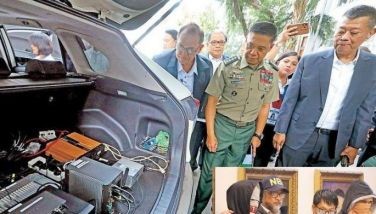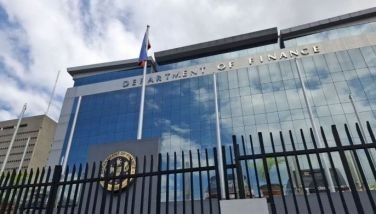4 new EDCA sites to benefit communities – DFA

MANILA, Philippines — Communities around the sites where US forces would have access under the Enhanced Defense Cooperation Agreement (EDCA) stand to benefit from a surge in economic activities, especially infrastructure development, the Department of Foreign Affairs (DFA) said yesterday, citing an assurance from the US.
The DFA said EDCA would jumpstart the construction of facilities and the upgrading of existing infrastructure that would directly contribute to communities and to the enhancement of the capabilities of the Armed Forces of the Philippines.
“We also appreciate the US commitment to prioritize the needs of our local communities and hope to do our share of bringing our alliance closer than ever to the benefit of the Filipino people,” the DFA said.
“More than construction in support of shared goals with the United States, these programs are investments by the Philippines in its own defense and security, benefitting military installations under the full ownership and operational control of the AFP,” the DFA said.
“EDCA will give us the needed infrastructure to develop our force in line with our acquisition of modern equipment,” AFP spokesman Col. Medel Aguilar said in a statement.
“The new EDCA sites are strategic in the AFP’s thrust to strengthen its capacity to protect the people and the state, advance our national interests and enhance the country’s disaster response capability,” he added.
The Pentagon made it clear yesterday that the designation of four new sites where American forces would have access under EDCA does not mean the US is preparing to establish permanent bases in the country.
“We’re not seeking permanent basing here, so you’re going to see an increase of rotational forces in the region, but this is more about supporting combined training, being able to respond to natural disaster, humanitarian disasters in the region but this is really about regional readiness,” Deputy Pentagon Press Secretary Sabrina Singh said at a briefing.
“Again, we do not seek permanent basing in the Philippines and this is just one additional aspect that will increase training between our two countries,” she added.
“This is more about regional response, regional readiness. This is an arrangement that we have with the Philippines that goes back many years. It’s not just about the region also for our forces to be able to spawn to any type of disasters, whether it be natural or humanitarian,” she said.
Malacañang on Monday identified the four new sites as Camilo Osias Naval Base in Santa Ana, Cagayan; Camp Melchor dela Cruz in Gamu, Isabela; Balabac Island in Palawan and Lal-lo Airport in Cagayan.
Existing locations are the Basa Air Base in Pampanga, Fort Magsaysay Military Reservation, Lumbia Air Base, Antonio Bautista Air Base and Mactan Benito Ebuen Air Base.
“In addition to the five existing sites, these new locations will strengthen the interoperability of the United States and Philippine armed forces and allow us to respond more seamlessly together to address a range of shared challenges in the Indo-Pacific region, including natural and humanitarian disasters,” Singh said.
The sites will also provide excellent places for joint and combined training and will improve regional readiness, she said, adding that US forces at these sites would operate on rotational basis.
The US Defense Department “will work in lockstep” with its counterpart in the Philippines and the armed forces to rapidly pursue modernization projects at the locations.
“The United States and the Philippines have stood together for more than seven decades, unwavering in treaty commitments and our shared vision for a more peaceful, secure and prosperous region,” she stated.
‘Self-interest’
Reacting to the development, Beijing said Washington was “endangering regional peace and stability.”
“Out of self-interest, the US maintains a zero-sum mentality and continues to strengthen its military deployment in the region,” foreign ministry spokeswoman Mao Ning said.
“The result will inevitably be increased military tension and endangering regional peace and stability,” she added.
“Countries in the region should think deeply about what is appropriate and what is mutually beneficial, so as to make choices that are truly beneficial to their own interests and to regional peace and stability,” she pointed out.
According to a statement from the State Department, US-Philippine relations are based on strong historical and cultural linkages and a shared commitment to democracy and human rights.
“The 1951 US-Philippines Mutual Defense Treaty provides a strong foundation for our robust post-World War II security partnership. Strong people-to-people ties and economic cooperation provide additional avenues to engage on a range of bilateral, regional and global issues,” it said.
In a statement, the US Defense Department said it intends to expand funding on top of the $82 million already allocated for infrastructure development at the existing EDCA sites.
“The United States is committed to ensuring its activities around EDCA sites are responsive to the needs and priorities of local communities, and we will continue to consult closely with the Philippines on new opportunities that serve our shared interests,” it said. “The strides we are making to expand the EDCA and modernize the alliance will ensure this vision endures far into the future.”
Full control
After warning that the US might be using EDCA to advance its own interest in the region, Sen. Ronald dela Rosa said the AFP – and not the US forces – should have full control over the sites under the security pact.
“No problem with me as long as (the EDCA sites) will be inside a Philippine military camp and access into it is fully controlled by the Philippine military,” said Dela Rosa, who earlier warned that Washington may just be using the Philippines to protect its interests in the region.
Dela Rosa last week said the Senate should take steps to have the EDCA scrapped after a member of the US Congress filed a bill seeking to suspend security assistance to the Philippines until former president Rodrigo Duterte and other officials of the previous administration are held accountable for the thousands of extrajudicial killings.
He lamented that Philippines-US relations seem to be “one-sided” with the latter having all the benefits.
Sen. Jinggoy Estrada, chairman of the Senate committee on national defense and security, earlier said the Philippines is not seeking war or wanting to cause instability in the region in strengthening its security alliance with the US or forging defense ties with other countries.
He said China’s misgivings over the designation of four new sites are inevitable as there is rising tension between the Chinese government and the US.
He said in agreeing to expand the EDCA locations, President Marcos has made it clear he does not want the issue to cause tension in the South China Sea or make China think of it as an act of aggression.
“We have a historical relationship with America. Apart from being their friend, we have a mutual defense treaty with them. Our Balikatan exercises are only exercises for the defense of the country and not for the invasion of China. We are not waging a war against China. In fact, China is our trade partner,” Estrada said.
“It is in our best interest to preserve and safeguard peace and promote stability and security with the help of our neighbors in Southeast Asia,” he said.
He said any confrontation between two major powers could be devastating for the world economy.
Raising tension
Militant group Bagong Alyansang Makabayan (Bayan) said the designation of new sites would only increase tensions with China.
“Particularly worrisome are the facilities in northern Philippines as these are obviously aimed at Taiwan and will increase tensions in the area,” Bayan secretary general Renato Reyes said in a statement.
Reyes said saying that sites are for humanitarian assistance and disaster response is nothing more than propaganda.
“Mr. Marcos should know that this isn’t a Hollywood movie like Top Gun. There are real and serious consequences to these geopolitical maneuvers,” he said.
Meanwhile, the US embassy said more than 17,600 members of the AFP and the US military will participate in the largest ever Balikatan exercise from April 11 to 28.
The embassy said approximately 5,400 AFP personnel and 12,200 US military personnel will train shoulder-to-shoulder, developing interoperability and improved capability in the areas of maritime security, amphibious operations, live-fire training, urban and aviation operations, cyber defense, counterterrorism and humanitarian assistance and disaster relief preparedness.
“The increase in participating personnel from Balikatan 2022’s 9,000 participants shows that the scope of the exercise grows consistently year after year,” the embassy said.
“Balikatan provides unparalleled opportunities to demonstrate the strength and readiness of the Philippine-US security alliance,” said Lt. Col. Daniel Huvane, Balikatan Combined Joint Information Director.
“Engagements such as Balikatan are important investments in our ability to work together across the spectrum of military operations, respond to crises, support the people of the Philippines and accomplish our shared missions,” he said.
The opening ceremonies will be held at Camp Aguinaldo on Tuesday next week. – Michael Punongbayan, Paolo Romero, Emmanuel Tupas
- Latest
- Trending
































